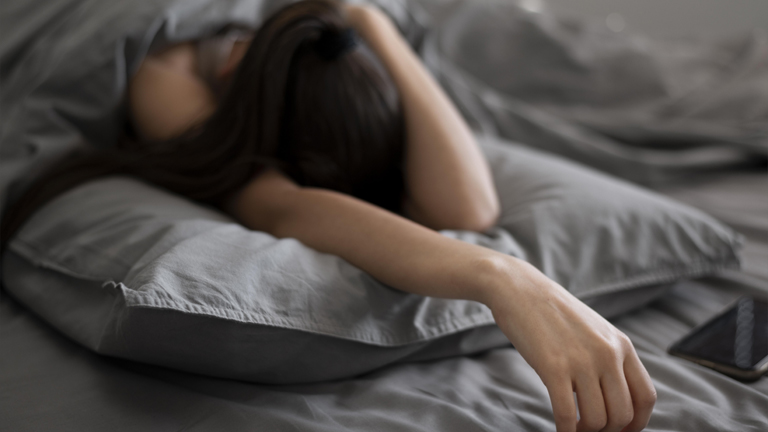Sleep deprivation and depression are closely intertwined, creating a vicious cycle that can be challenging to break. Research shows that poor sleep quality and insufficient rest significantly increase the risk of developing depressive symptoms. Conversely, depression often leads to insomnia and disrupted sleep patterns.
This bidirectional relationship makes it essential to understand how sleep affects mental health and vice versa. In this article, we’ll explore the science behind sleep and depression, the key neurochemicals involved, common sleep disorders linked to mood disorders, and effective treatment strategies.
The Science Behind Sleep and Mental Health
Sleep is not just a passive state of rest—it plays a critical role in brain function, emotional regulation, and overall mental well-being. During sleep, the brain processes emotions, consolidates memories, and restores cognitive functions.
- Deep Sleep (NREM): Helps with physical recovery and memory retention.
- REM Sleep: Essential for emotional processing and mood regulation.
When sleep is disrupted, these processes are impaired, leading to increased irritability, anxiety, and depressive symptoms.
How Sleep Deprivation Triggers Depressive Symptoms
Chronic sleep deprivation has a profound impact on mental health, often mimicking or exacerbating depressive symptoms. Some key effects include:
- Increased Negative Thinking: Sleep loss heightens activity in the amygdala (the brain’s emotional center), making individuals more prone to negative thoughts.
- Reduced Cognitive Function: Poor sleep impairs decision-making, focus, and problem-solving abilities.
- Emotional Instability: Lack of REM sleep disrupts emotional regulation, leading to mood swings and heightened stress responses.
Studies have found that individuals who sleep less than 6 hours per night are significantly more likely to develop depression than those who get 7-9 hours.
The Bidirectional Relationship: Does Depression Cause Poor Sleep?
The connection between sleep deprivation and depression works both ways:
- Depression → Sleep Problems: People with depression often experience insomnia (difficulty falling or staying asleep) or hypersomnia (excessive sleep).
- Sleep Problems → Depression: Chronic insomnia increases the risk of developing depression by up to 10 times.
This cycle makes it difficult to determine which comes first, emphasizing the need for integrated treatment approaches.
Key Neurochemicals Affected by Sleep Loss (Serotonin, Dopamine, Cortisol)
Sleep deprivation disrupts the balance of crucial brain chemicals that regulate mood:
- Serotonin: A neurotransmitter linked to happiness and well-being. Low levels are associated with depression, and poor sleep reduces serotonin production.
- Dopamine: Affects motivation and pleasure. Sleep loss decreases dopamine sensitivity, leading to anhedonia (inability to feel joy).
- Cortisol: The stress hormone. Sleep deprivation increases cortisol levels, worsening anxiety and depressive symptoms.
Additionally, melatonin, the sleep hormone, is closely connected to serotonin. Disruptions in melatonin production (common in shift workers) can contribute to mood disorders.
Sleep Disorders Linked to Depression (Insomnia, Sleep Apnea, Restless Legs)
Several sleep disorders are strongly associated with depression:
- Insomnia: Difficulty falling or staying asleep is both a symptom and a risk factor for depression.
- Sleep Apnea: Interrupted breathing during sleep leads to poor sleep quality and oxygen deprivation, increasing depression risk.
- Restless Legs Syndrome (RLS): Uncomfortable sensations in the legs disrupt sleep, contributing to mood disturbances.
Treating these underlying sleep disorders can significantly improve depressive symptoms.
The Role of REM Sleep in Emotional Regulation
REM (Rapid Eye Movement) sleep is crucial for processing emotions. During REM sleep:
- The brain reviews emotional experiences from the day.
- Stress responses are regulated.
- Negative memories are processed and stored properly.
When REM sleep is disrupted (common in depression), emotional regulation suffers, leading to heightened anxiety and depressive thoughts.
Real-Life Effects: Cognitive Decline and Mood Swings
The long-term effects of sleep deprivation on mental health include:
- Memory Problems: Poor sleep impairs both short-term and long-term memory.
- Reduced Concentration: Lack of sleep affects attention span and productivity.
- Increased Irritability: Sleep loss makes individuals more prone to anger and frustration.
- Higher Suicide Risk: Severe insomnia is linked to increased suicidal ideation.
Sleep Hygiene Tips to Combat Depression
Improving sleep quality can significantly alleviate depressive symptoms. Here are some evidence-based sleep hygiene tips:
- Maintain a Consistent Sleep Schedule: Go to bed and wake up at the same time daily.
- Limit Screen Time Before Bed: Blue light from devices suppresses melatonin.
- Create a Relaxing Bedtime Routine: Reading, meditation, or warm baths can help.
- Avoid Caffeine and Alcohol Before Bed: Both disrupt sleep cycles.
- Exercise Regularly: Physical activity improves sleep quality and boosts mood.
- Optimize Your Sleep Environment: Keep the bedroom dark, cool, and quiet.
Treatment Options: CBT-I, Medication, and Lifestyle Changes
For those struggling with sleep deprivation and depression, several treatments can help:
- Cognitive Behavioral Therapy for Insomnia (CBT-I): A structured program that addresses negative thought patterns around sleep.
- Medications: Antidepressants (like SSRIs) and sleep aids (like melatonin supplements) may be prescribed.
- Light Therapy: Helps regulate circadian rhythms, especially for seasonal depression.
- Mindfulness and Relaxation Techniques: Yoga, deep breathing, and meditation improve sleep and mood.
Conclusion: Breaking the Cycle of Sleep Deprivation and Depression
The link between sleep deprivation and depression is undeniable. Poor sleep worsens mood disorders, and depression further disrupts sleep, creating a challenging cycle. However, by prioritizing sleep hygiene, seeking professional treatment, and addressing underlying sleep disorders, individuals can improve both their sleep and mental health.
If you or someone you know is struggling with sleep and depression, consulting a healthcare provider is essential for personalized treatment. Better sleep leads to a healthier mind—don’t underestimate its power.
Final Thoughts
Sleep is not a luxury—it’s a necessity for mental well-being. By understanding and addressing the connection between sleep deprivation and depression, we can take meaningful steps toward improved emotional health and overall quality of life.
Would you like personalized recommendations for better sleep? Share your experiences in the comments below!

